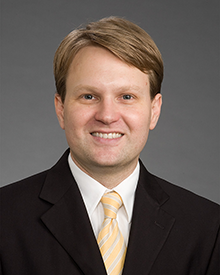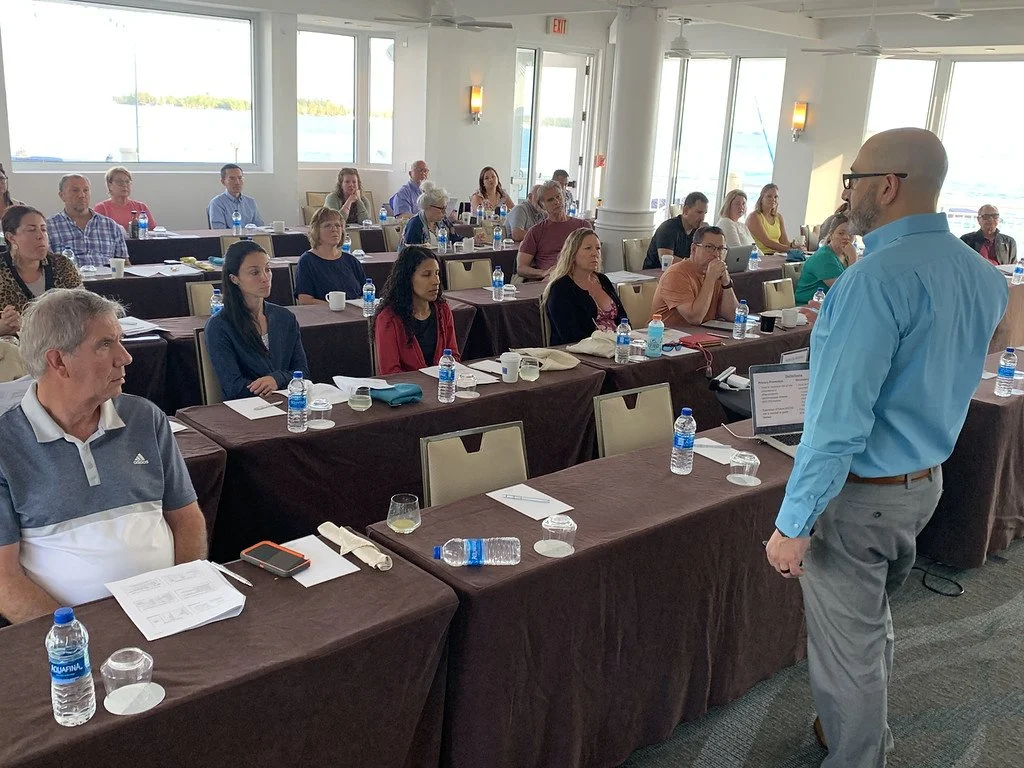
Primary Care Update 2024
June 4-6 2024
“This session was truly excellent. The speaker was very knowledgeable and engaging. Without a doubt, this is one of the best CME sessions I have ever attended. I will be looking out for other opportunities to attend University Learning CME conferences in the future.”
“No conerns - well done with current updates and recommendations to new standards in therapy”
“Just a comment - Excellent speaker!! Very knowledgeable and engaging. Thank you! ”
Sample from June 4 2024
Reamer L. Bushardt, PharmD, PA-C, DFAAPA
Dr. Bushardt serves as Provost & Vice President for Academic Affairs, joining the MGH Institute in August 2022. He is also a professor in our Physician Assistant Studies department. As Provost, he is the Institute’s chief academic officer with responsibility for all academic programs, research programs, faculty, students, and other trainees. Bushardt is a seasoned educator, researcher, clinician, and administrator with experience in rural, community-based practice and prior faculty service within three academic medical centers. He is licensed as a PA and pharmacist with specialized training and experience in caring for older adults and has designed novel interventions to identify and address inappropriate polypharmacy and reduce the risk of drug injury. As a PA, he has spent more than twenty years in primary care practice, including family medicine, general internal medicine, and geriatrics settings.
Dr. Joseph Saseen, Pharm.D., FASHP, FCCP, BCPS, BCACP
Joseph Saseen is Associate Dean for Clinical Affairs and Professor of Clinical Pharmacy and a Professor of Family Medicine. He also served as Vice Chair of the Department of Clinical Pharmacy for 10 years. Dr. Saseen has responsibilities for enhancing the school’s clinical enterprise, further developing sustainable clinical service models, and advocating for advancing the practice of pharmacy in the State of Colorado. His scholarly work includes almost 200 peer-reviewed publications and book chapters.
About This CourseThis on demand course was recorded live in Westgate Resort and Casino where Las Vegason June 4-6, 2024. Itprovides 15 hours. live AAFP/ AMA PRA Category 1 Credit™, ACPE and pharmacology CE/ CME credit.
Best Practices in Prescribing Opioids
Avoid Drug Injury in Older Adults, and Drug Therapy
Pharmacotherapy for Cardiovascular Risk Reduction
Price $299
-
Section 1: Best Practices in Prescribing Opioids: A regulatory perspective .
Describe evolving opioid prescribing and regulatory practices in the United States.
Discuss recently released opioid prescribing guidelines, highlighting the relevance to outpatient treatment of pain.
Describe best practices and patient care resources for managing patients with acute or chronic nonmalignant pain, highlighting guidance from a regulatory per-spective. Regulatory Cases with Opioid Medications
Apply best practices in the prescribing of opioids and other controlled substances.
Discuss key physiologic and common pathophysiologic changes of aging that impact drug therapy .
Session 2: Addiction as a Brain Disease:
Examine the neurobiological responses to substances of abuse,.
Describe howyour brain responds to drugs.
Explore how addiction affects the brain.
Examine behavioral changes in addiction.
Session 3: Screening, Brief Intervention, and Referral to Treatment (SBIRT):
Explore SBIRT (Screening, Brief Intervention, and Referral to Treatment) as a routine part of care in all healthcare settings.
Review guidelines for providing, billing, and coding for SBIRT services. Case Study in Acute Post-Operative Pain and Diversion Control :
Integrate best practicesor appropriate prescribing of controlled substances, screening for substance use disorders, and diversion control.
-
Session 1: Avoiding Drug Injury in Older Adults: A focus on controlled substances
Discuss key physiologic and common pathophysiologic changes of aging that impact drug therapy.
Case Study in Identifying and Avoiding Drug Injury in Older Adults
Apply age-sensitive principles for medication dosing and management to clinical scenarios.
Session 2: Optimizing Drug Therapy and Avoiding Drug Injury in Older Adults
List nine key questions useful for identifying and managing inappropriate polypharmacy (i.e. unnecessary medication use) in older adults.
Discuss high risk drug-drug and drug-dietary supplement interactions commonly encountered in primary care, including best practices in identifying and managing related toxicities.
Case Study in Optimizing Drug Therapy in Older Adults
Apply practical tools to screen and appropriately manage complex drug regimens among older adults with or at-risk for drug injury.
Session 3: Drug Therapy for Depression
Discuss pharmacologic management options within clinical cases of adults with depression.
Relate physiologic and pathophysiologic alternations of brain neurochemistry to symptoms of depression, including the genetic link and molecular basis of injury.
Apply clinical practice guidelines for antidepressant therapies.
Describe key parameters for medications used to treat mechanism, safety, tolerability, efficacy, cost, and simplicity of use.
Case Study in Diabetes and Depression-diagnosis and treatment
Apply practical tools to screen diabetic patients for depression and appropriately manage depression in diabetic patients.
Session 4: Medical Management of Common Substance Use Disorders
Explore evidence-based treatment approaches for substance use disorders.
Discuss strategies to fully engage patients and their families in the process, including shared decision-making and building trust.
Gain insights into pharmacotherapeutic treatments, including their mechanisms of action, risks, and benefits as well as relevant psychosocial and psychotherapeutic interventions.
-
Explain recommendations from the American College of Cardiology/American Heart Association guidelines for treatment of patients with hypertension, hypercholesterolemia, chronic coronary disease, peripheral arterial disease, heart failure, and atrial fibrillation.
Identify how future cardiovascular risk is estimated in primary prevention patients using the Pooled Cohort Equations and PREVENT calculator.
List recommendations from the ACC Expert Consensus Decision Pathway for nonstatins and treatment of hypertriglyceridemia
List guideline recommendations supporting the use of antiplatelet therapy for primary prevention patients.
Summarize the evidence-based CV risk reduction benefits of medications used to treat overweight and obese patients.
Recognize the role of colchicine in the prevention of CV events.
Select treatment plans that reduce the risk of cardiovascular disease.
Conference Credit
PHARMACISTS : University Learning Systems is accredited by the Accreditation Council for Pharmacy Education (ACPE) as a provider of continuing pharmacy education.
NURSE PRACTITIONERS/ NURSES: This course provides 15 contact hours to fulfill the pharmacotherapeutics/ pharmacology requirements for American Nurses Credentialing Center (ANCC) Category 1 Continuing Education Hours for certification renewal as well as other Nurse Practitioner credentialing organizations. The same hours submitted to renew certification may be submitted to a State Board of Nursing for re-licensure. American Nurses Credentialing Center (ANCC) accepts formally approved continuing education sponsored by organizations accredited or approved by the Accreditation Council for Pharmacy Education (ACPE). .
PHYSICIANS: This CME program offers Category 2 credit.
PHYSICIAN ASSISTANTS: This CME program offers Category 2 credit.
CONSULTANT PHARMACISTS: Some consultant pharmacist boards accept University Learning Systems courses for recertification either as is or with board approval. Please contact your board regarding course approval and ULS with any questions.
CANADIAN PHARMACISTS: Canadian Council on Continuing Education in Pharmacy (CCCEP) accepts courses accredited by the Accreditation Council for Pharmacy Education (ACPE). This credit is applicable to health professionals who may require pharmacology credit.
CANADIAN PHYSICIANS: Members of the College of Family Physicians of Canada are eligible to receive up to 15 MAINPRO-M1 credits for participation in this activity due to reciprocal agreement with the American Academy of Family Physicians.
OTHER HEALTH PROFESSIONALS: Contact your respective board regarding approval
| Session |
Contact Hours |
ACPE UAN |
Activity |
|
Session 1 |
5 |
0741-0000-24-022-H01-P |
Application |
| Session 2 | 5 | 0741-0000-24-023-H01-P | Application |
| Session 3 | 5 | 0741-0000-24-024-H01-P | Application |


